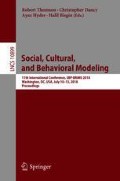Abstract
Social media research often exploits metrics based on frequency counts, e.g., to determine corpus sentiment. Hampton and Shalin [1] introduced an alternative metric examining the style and structure of social media relative to an Internet language baseline. They demonstrated statistically significant differences in lexical choice from tweets collected in a disaster setting relative to the standard. One explanation of this finding is that the Twitter platform, irrespective of disaster setting, and/or specifics of the English language, is responsible for the observed differences . In this paper, we apply the same metric to German corpora, to compare an event-based (the recent election) with a “nothing” crawl, with respect to the use of German modal particles. German modal particles are often used in spoken language and typically regarded as stop words in text mining. This word class is likely to reflect public engagement because of its properties, such as indicating common ground, or reference to previous utterances (i.e. anaphora) [2, 3]. We demonstrate a positive deviation of most modal particles for all corpora relative to general Internet language, consistent with the view that Twitter constitutes a form of conversation. However, the use of modal particles also generally increased in the three corpora related to the 2017 German election relative to the “nothing” corpus. This indicates topic influence beyond platform affordances and supports an interpretation of the German election data as an engaged, collective narrative response to events. Using commonly eliminated features, our finding supports and extends Hampton and Shalin’s analysis that relied on pre-selected antonyms and suggests an alternative method to frequency counts to identify corpora that differ in public engagement.
Access this chapter
Tax calculation will be finalised at checkout
Purchases are for personal use only
References
Hampton, A.J., Shalin, V.L.: Sentinels of breach: lexical choice as a metric of urgency. Hum. Factors 59(4), 505–519 (2017). Davis, K. (ed.) Special Issue on Big Data/Winner of the 2016 Human Factors Prize
Thurmair, M.: Modalpartikeln und ihre Kombinationen. De Gruyter, Berlin (1989)
Bross, F.: German modal particles and the common ground. Helikon. Multidiscip. Online J. 2, 182–209 (2012)
Pang, B., Lee, L.: Seeing stars: exploiting class relationships for sentiment categorization with respect to rating scales. In: Proceedings of the 43rd Annual Meeting on Association for Computational Linguistics, pp. 115–124. Association for Computational Linguistics, Stroudsburg (2005). https://doi.org/10.3115/1219840.1219855
Purohit, H., Hampton, A., Shalin, V.L., Sheth, A.P., Flach, J.M., Bhatt, S.: What kind of #conversation is Twitter? Mining #psycholinguistic cues for emergency coordination. Comput. Hum. Behav. 29(6), 2438–2447 (2013)
Purohit, H., Hampton, A., Bhatt, S., Shalin, V.L., Sheth, A.P., Flach, J.M.: Identifying seekers and suppliers in social media communities to support crisis coordination. Comput. Support. Coop. Work (CSCW) 23(4–6), 513–545 (2014)
Purohit, H., Banerjee, T., Hampton, A., Shalin, V.L., Bhandutia, N., Sheth, A.: Gender-based violence in 140 characters or fewer: a #BigData case study of Twitter. First Monday 21(1–4) (2016)
Ebrahimi, M., Yazdavar, A.H., Sheth, A.: On the challenges of sentiment analysis for dynamic events. IEEE Intell. Syst. 32(5), 70–75 (2017)
Thelwall, M., Buckley, K., Paltoglou, G., Cai, D., Kappas, A.: Sentiment strength detection in short informal text. J. Am. Soc. Inform. Sci. Technol. 61(12), 2544–2558 (2010)
Thelwall, M., Buckley, K., Paltoglou, G.: Sentiment in Twitter events. J. Am. Soc. Inform. Sci. Technol. 62(2), 406–418 (2011)
Pang, B., Lee, L.: Opinion mining and sentiment analysis. Found. Trends® Inf. Retr. 2(1–2), 1–135 (2008)
Weydt, H.: Abtönungspartikel: die deutschen Modalwörter und ihre französischen Entsprechungen. Gehlen (1969)
Weydt, H., Hentschel, E.: Kleines Abtönungswörterbuch. In: Weydt, H. (ed.) Partikel und Interaktion, pp. 3–24. Niemeyer, Tübingen (1983)
Helbig, G.: Lexikon deutscher Partikeln. Verlag Enzyklopädie (1988)
Diewald, G.: Abtönungspartikel. In: Hoffmann, L. (ed.) Handbuch der deutschen Wortarten, pp. 117–142. De Gruyter, Berlin, New York (2007)
Götze, M., Geyer, S.: https://solariz.de/de/downloads/6/german-enhanced-stopwords.htm. Accessed 10 Mar 2018
Sheth, A., Jadhav, A., Kapanipathi, P., Lu, C., Purohit, H., Smith, G.A., Wang, W.: Twitris: a system for collective social intelligence. In: Alhajj, R., Rokne, J. (eds.) Encyclopedia of Social Network Analysis and Mining, pp. 2240–2253. Springer, New York (2014). https://doi.org/10.1007/978-1-4614-6170-8_345
Schäfer, R.: Processing and querying large web corpora with the COW14 architecture. In: Bański, P., Biber, H., Breiteneder, E., Kupietz, M., Lüngen, H., Witt, A. (eds.) Proceedings of Challenges in the Management of Large Corpora 3 (CMLC-3). IDS, Lancaster (2015)
Schäfer, R., Bildhauer, F.: Building large corpora from the web using a new efficient tool Chain. In: Calzolari, N., Choukri, K., Declerck, T., Doğan, M.U., Maegaard, B., Mariani, J., Moreno, A., Odijk, J., Piperidis, S. (eds.) Proceedings of the Eight International Conference on Language Resources and Evaluation (LREC 2012), pp. 486–493. European Language Resources Association (ELRA), Istanbul (2012)
Lipsey, M.W., Wilson, D.B.: Practical Meta-Analysis. Sage Publications Inc., Thousand Oaks (2001)
Acknowledgments
The first author recognizes support from the German Academic Exchange Service (DAAD). The third author’s participation in this research was partially supported by NSF grants CNS 1513721 and EAR 1520870.
Author information
Authors and Affiliations
Corresponding author
Editor information
Editors and Affiliations
Rights and permissions
Copyright information
© 2018 Springer International Publishing AG, part of Springer Nature
About this paper
Cite this paper
Rüsenberg, F., Hampton, A.J., Shalin, V.L., Feufel, M.A. (2018). Stop Words Are Not “Nothing”: German Modal Particles and Public Engagement in Social Media. In: Thomson, R., Dancy, C., Hyder, A., Bisgin, H. (eds) Social, Cultural, and Behavioral Modeling. SBP-BRiMS 2018. Lecture Notes in Computer Science(), vol 10899. Springer, Cham. https://doi.org/10.1007/978-3-319-93372-6_11
Download citation
DOI: https://doi.org/10.1007/978-3-319-93372-6_11
Published:
Publisher Name: Springer, Cham
Print ISBN: 978-3-319-93371-9
Online ISBN: 978-3-319-93372-6
eBook Packages: Computer ScienceComputer Science (R0)

